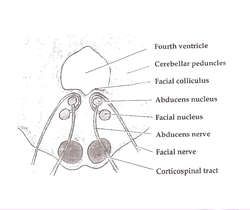Medial pontine syndrome

Editor-In-Chief: Prab R Tumpati, MD
Obesity, Sleep & Internal medicine
Founder, WikiMD Wellnesspedia &
W8MD's medical weight loss NYC, sleep center NYC
Philadelphia medical weight loss and Philadelphia sleep clinics
| Medial pontine syndrome | |
|---|---|

| |
| Synonyms | Foville's syndrome |
| Pronounce | N/A |
| Specialty | Neurology |
| Symptoms | Contralateral hemiparesis, ipsilateral facial paralysis, internuclear ophthalmoplegia |
| Complications | N/A |
| Onset | N/A |
| Duration | N/A |
| Types | N/A |
| Causes | Stroke, multiple sclerosis, tumor |
| Risks | N/A |
| Diagnosis | MRI, CT scan |
| Differential diagnosis | N/A |
| Prevention | N/A |
| Treatment | Physical therapy, occupational therapy, speech therapy, anticoagulants |
| Medication | N/A |
| Prognosis | Variable, depends on the underlying cause and extent of damage |
| Frequency | Rare |
| Deaths | N/A |

Medial Pontine Syndrome is a neurological condition that results from a blockage in the blood supply to the base of the pons, a part of the brainstem. This blockage can lead to a variety of symptoms, including weakness or paralysis on one side of the body, difficulty with speech and swallowing, and problems with sensation and coordination.
Causes[edit]
The primary cause of Medial Pontine Syndrome is a stroke, specifically an ischemic stroke, which occurs when blood flow to a part of the brain is blocked. This can be due to a blood clot or a buildup of plaque in the arteries. Other potential causes include trauma to the brain, infections, and tumors.
Symptoms[edit]
The symptoms of Medial Pontine Syndrome can vary depending on the exact location and extent of the damage to the pons. Common symptoms include:
- Hemiparesis or hemiplegia: Weakness or paralysis on one side of the body
- Dysarthria: Difficulty with speech
- Dysphagia: Difficulty with swallowing
- Ataxia: Problems with coordination and balance
- Sensory loss: Loss of sensation on the opposite side of the body
Diagnosis[edit]
Diagnosis of Medial Pontine Syndrome is typically made based on the patient's symptoms and a neurological examination. Imaging tests such as a CT scan or MRI may be used to confirm the diagnosis and determine the extent of the damage.
Treatment[edit]
Treatment for Medial Pontine Syndrome is primarily focused on addressing the underlying cause of the condition. This may involve medications to break up a blood clot or reduce plaque buildup in the arteries, surgery to remove a tumor, or antibiotics to treat an infection. Rehabilitation therapy may also be needed to help the patient regain lost functions.
Prognosis[edit]
The prognosis for Medial Pontine Syndrome can vary widely depending on the severity of the condition and the patient's overall health. Some patients may make a full recovery, while others may have lasting disabilities.
See Also[edit]
Ad. Transform your life with W8MD's Budget GLP-1 injections from $75


W8MD offers a medical weight loss program to lose weight in Philadelphia. Our physician-supervised medical weight loss provides:
- Weight loss injections in NYC (generic and brand names):
- Zepbound / Mounjaro, Wegovy / Ozempic, Saxenda
- Most insurances accepted or discounted self-pay rates. We will obtain insurance prior authorizations if needed.
- Generic GLP1 weight loss injections from $75 for the starting dose.
- Also offer prescription weight loss medications including Phentermine, Qsymia, Diethylpropion, Contrave etc.
NYC weight loss doctor appointmentsNYC weight loss doctor appointments
Start your NYC weight loss journey today at our NYC medical weight loss and Philadelphia medical weight loss clinics.
- Call 718-946-5500 to lose weight in NYC or for medical weight loss in Philadelphia 215-676-2334.
- Tags:NYC medical weight loss, Philadelphia lose weight Zepbound NYC, Budget GLP1 weight loss injections, Wegovy Philadelphia, Wegovy NYC, Philadelphia medical weight loss, Brookly weight loss and Wegovy NYC
|
WikiMD's Wellness Encyclopedia |
| Let Food Be Thy Medicine Medicine Thy Food - Hippocrates |
Medical Disclaimer: WikiMD is not a substitute for professional medical advice. The information on WikiMD is provided as an information resource only, may be incorrect, outdated or misleading, and is not to be used or relied on for any diagnostic or treatment purposes. Please consult your health care provider before making any healthcare decisions or for guidance about a specific medical condition. WikiMD expressly disclaims responsibility, and shall have no liability, for any damages, loss, injury, or liability whatsoever suffered as a result of your reliance on the information contained in this site. By visiting this site you agree to the foregoing terms and conditions, which may from time to time be changed or supplemented by WikiMD. If you do not agree to the foregoing terms and conditions, you should not enter or use this site. See full disclaimer.
Credits:Most images are courtesy of Wikimedia commons, and templates, categories Wikipedia, licensed under CC BY SA or similar.
Translate this page: - East Asian
中文,
日本,
한국어,
South Asian
हिन्दी,
தமிழ்,
తెలుగు,
Urdu,
ಕನ್ನಡ,
Southeast Asian
Indonesian,
Vietnamese,
Thai,
မြန်မာဘာသာ,
বাংলা
European
español,
Deutsch,
français,
Greek,
português do Brasil,
polski,
română,
русский,
Nederlands,
norsk,
svenska,
suomi,
Italian
Middle Eastern & African
عربى,
Turkish,
Persian,
Hebrew,
Afrikaans,
isiZulu,
Kiswahili,
Other
Bulgarian,
Hungarian,
Czech,
Swedish,
മലയാളം,
मराठी,
ਪੰਜਾਬੀ,
ગુજરાતી,
Portuguese,
Ukrainian


